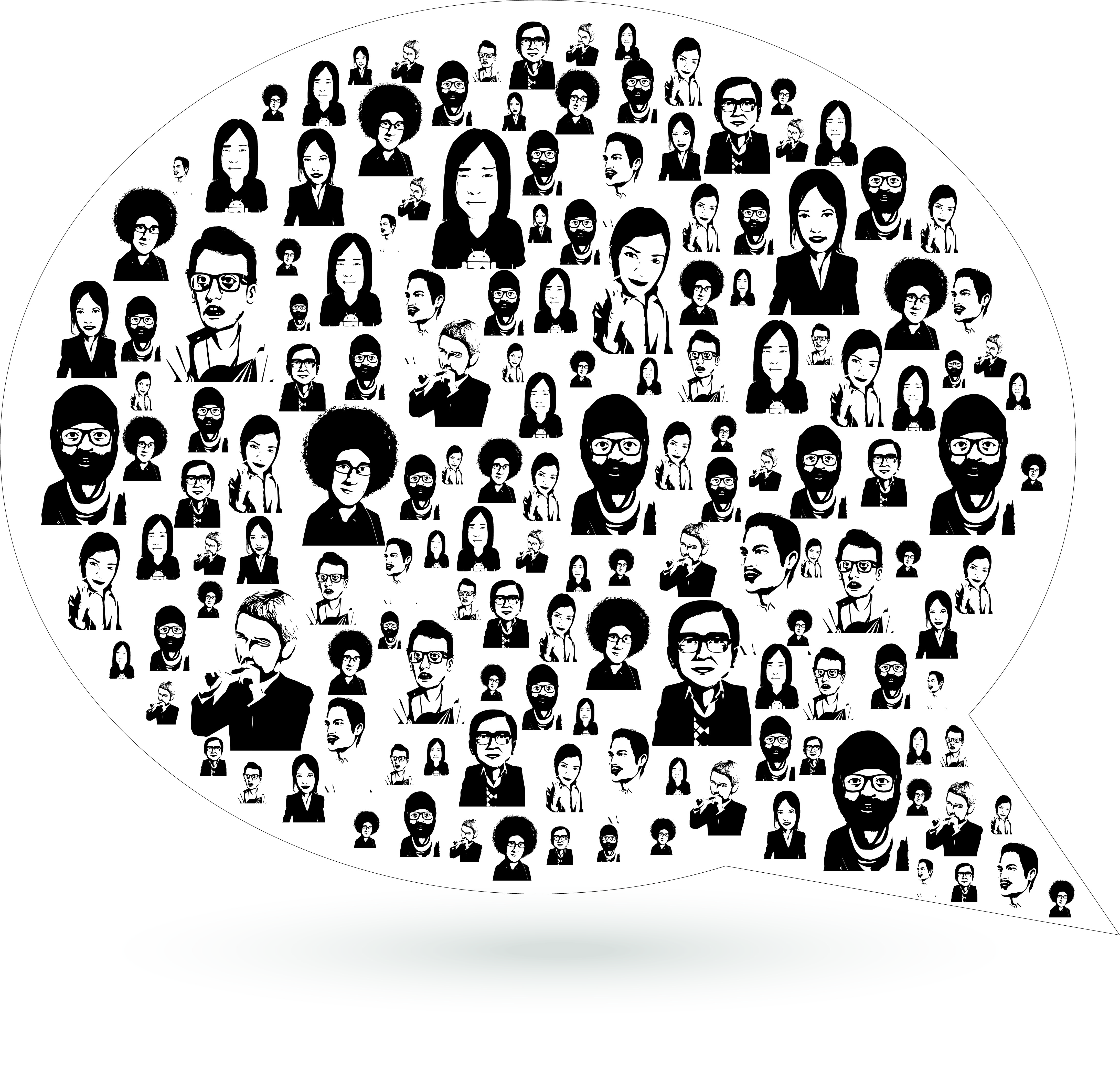|
Distributed Knowledge
In multi-agent system research, distributed knowledge is all the knowledge that a community of agents possesses and might apply in solving a problem. Distributed knowledge is approximately what "a wise man knows", or what someone who has complete knowledge of what each member of the community knows knows. Distributed knowledge might also be called the aggregate knowledge of a community, as it represents all the knowledge that a community might bring to bear to solve a problem. Other related phrasings include cumulative knowledge, collective knowledge or pooled knowledge. Distributed knowledge is the union of all the knowledge of individuals in a community of agents. Distributed knowledge differs from the concept of Wisdom of the crowd, in that the latter is concerned with opinions, not knowledge. Wisdom of the crowd is the emergent opinion arising from multiple actors. It is not the union of all the knowledge of these actors, it does not necessarily include the contribution of ... [...More Info...] [...Related Items...] OR: [Wikipedia] [Google] [Baidu] |
Multi-agent System
A multi-agent system (MAS or "self-organized system") is a computerized system composed of multiple interacting intelligent agents.H. Pan; M. Zahmatkesh; F. Rekabi-Bana; F. Arvin; J. HuT-STAR: Time-Optimal Swarm Trajectory Planning for Quadrotor Unmanned Aerial Vehicles IEEE Transactions on Intelligent Transportation Systems, 2025. Multi-agent systems can solve problems that are difficult or impossible for an individual agent or a monolithic system to solve.Hu, J.; Turgut, A.; Lennox, B.; Arvin, F.,Robust Formation Coordination of Robot Swarms with Nonlinear Dynamics and Unknown Disturbances: Design and Experiments IEEE Transactions on Circuits and Systems II: Express Briefs, 2021. Intelligence may include methodic, functional, procedural approaches, algorithmic search or reinforcement learning. With advancements in large language models (LLMs), LLM-based multi-agent systems have emerged as a new area of research, enabling more sophisticated interactions and coordination amon ... [...More Info...] [...Related Items...] OR: [Wikipedia] [Google] [Baidu] |
Wisdom Of The Crowd
"Wisdom of the crowd" or "wisdom of the majority" expresses the notion that the collective opinion of a diverse and independent group of individuals (rather than that of a single expert) yields the best judgement. This concept, while not new to the Information Age, has been pushed into the spotlight by social information sites such as Quora, Reddit, Stack Exchange, Wikipedia, Yahoo! Answers, and other web resources which rely on collective human knowledge. An explanation for this supposition is that the idiosyncratic noise associated with each individual judgment is replaced by an average of that noise taken over a large number of responses, tempering the effect of the noise. Trial by jury can be understood as at least partly relying on wisdom of the crowd, compared to bench trial which relies on one or a few experts. In politics, sometimes sortition is held as an example of what wisdom of the crowd would look like. Decision-making would happen by a diverse group instead of ... [...More Info...] [...Related Items...] OR: [Wikipedia] [Google] [Baidu] |
Knowledge-based Systems
A knowledge-based system (KBS) is a computer program that reasons and uses a knowledge base to solve complex problems. Knowledge-based systems were the focus of early artificial intelligence researchers in the 1980s. The term can refer to a broad range of systems. However, all knowledge-based systems have two defining components: an attempt to represent knowledge explicitly, called a knowledge base, and a reasoning system that allows them to derive new knowledge, known as an inference engine. Components The knowledge base contains domain-specific facts and rules about a problem domain (rather than knowledge implicitly embedded in procedural code, as in a conventional computer program). In addition, the knowledge may be structured by means of a subsumption ontology, frames, conceptual graph, or logical assertions. The inference engine uses general-purpose reasoning methods to infer new knowledge and to solve problems in the problem domain. Most commonly, it employs forw ... [...More Info...] [...Related Items...] OR: [Wikipedia] [Google] [Baidu] |
Only If
In logic and related fields such as mathematics and philosophy, "if and only if" (often shortened as "iff") is paraphrased by the biconditional, a logical connective between statements. The biconditional is true in two cases, where either both statements are true or both are false. The connective is biconditional (a statement of material equivalence), and can be likened to the standard material conditional ("only if", equal to "if ... then") combined with its reverse ("if"); hence the name. The result is that the truth of either one of the connected statements requires the truth of the other (i.e. either both statements are true, or both are false), though it is controversial whether the connective thus defined is properly rendered by the English "if and only if"—with its pre-existing meaning. For example, ''P if and only if Q'' means that ''P'' is true whenever ''Q'' is true, and the only case in which ''P'' is true is if ''Q'' is also true, whereas in the case of ''P if Q'', ... [...More Info...] [...Related Items...] OR: [Wikipedia] [Google] [Baidu] |
Common Knowledge
Common knowledge is knowledge that is publicly known by everyone or nearly everyone, usually with reference to the community in which the knowledge is referenced. Common knowledge can be about a broad range of subjects, such as science, literature, history, or entertainment. Since individuals often have different knowledge bases, common knowledge can vary and it may sometimes take large-scale studies to know for certain what is common knowledge amongst large groups of people. Often, common knowledge does not need to be cited. Common knowledge is distinct from general knowledge. In broader terms, common knowledge is used to refer to information that an agent would accept as valid, such as information that multiple users may know. Assigning something the label of common knowledge requires certain considerations about the involved community, group, society and/or individuals, the time period, and the location. Variation Defining something as common knowledge can differ based o ... [...More Info...] [...Related Items...] OR: [Wikipedia] [Google] [Baidu] |
Dispersed Knowledge
Dispersed knowledge in economics is the notion that no single agent has information as to all of the factors which influence prices and production throughout the system. The term has been both expanded upon and popularized by American economist Thomas Sowell. Overview Each agent in a market for assets, goods, or services possesses incomplete knowledge as to most of the factors which affect prices in that market. For example, no agent has full information as to other agents' budgets, preferences, resources or technologies, not to mention their plans for the future and numerous other factors which affect prices in those markets. Market prices are the result of price discovery, in which each agent participating in the market makes use of its current knowledge and plans to decide on the prices and quantities at which it chooses to transact. The resulting prices and quantities of transactions may be said to reflect the current state of knowledge of the agents currently in the mar ... [...More Info...] [...Related Items...] OR: [Wikipedia] [Google] [Baidu] |
Discipline (specialism)
An academic discipline or academic field is a subdivision of knowledge that is taught and researched at the college or university level. Disciplines are defined (in part) and recognized by the academic journals in which research is published, and the learned societies and academic departments or faculties within colleges and universities to which their practitioners belong. Academic disciplines are conventionally divided into the humanities (including philosophy, language, art and cultural studies), the scientific disciplines (such as physics, chemistry, and biology); and the formal sciences like mathematics and computer science. The social sciences are sometimes considered a fourth category. It is also known as a ''field of study'', ''field of inquiry'', ''research field'' and ''branch of knowledge''. The different terms are used in different countries and fields. Individuals associated with academic disciplines are commonly referred to as ''experts'' or ''specialists''. Others ... [...More Info...] [...Related Items...] OR: [Wikipedia] [Google] [Baidu] |
Knowledge Tags
In information systems, a tag is a keyword or term assigned to a piece of information (such as an Internet bookmark, multimedia, database record, or computer file). This kind of metadata helps describe an item and allows it to be found again by browsing or searching. Tags are generally chosen informally and personally by the item's creator or by its viewer, depending on the system, although they may also be chosen from a controlled vocabulary. Tagging was popularized by websites associated with Web 2.0 and is an important feature of many Web 2.0 services. It is now also part of other database systems, desktop applications, and operating systems. Overview People use tags to aid classification, mark ownership, note boundaries, and indicate online identity. Tags may take the form of words, images, or other identifying marks. An analogous example of tags in the physical world is museum object tagging. People were using textual keywords to classify information and objects lon ... [...More Info...] [...Related Items...] OR: [Wikipedia] [Google] [Baidu] |
Interactional Expertise
Interactional expertise is part of a more complex classification of expertise developed by Harry Collins and Robert Evans (both based at Cardiff University). In this initial formulation interactional expertise was part of a threefold classification of substantive expertise that also included ‘no expertise’ and ‘contributory expertise’, by which they meant the expertise needed to contribute fully to all aspects of a domain of activity. Classification The distinction between these three different types of expertise can be illustrated by imagining the experience of a social science researcher approaching a topic for the first time. It is easy to see that, whether the research project is to be about plumbing or physics, most researchers will start from a position of ‘no expertise’ in that area. As the research project proceeds and the social interactions between the researcher and the plumbers or physicists continue, the social researcher will become increasingly knowledge ... [...More Info...] [...Related Items...] OR: [Wikipedia] [Google] [Baidu] |
Crowdsourcing
Crowdsourcing involves a large group of dispersed participants contributing or producing goods or services—including ideas, votes, micro-tasks, and finances—for payment or as volunteers. Contemporary crowdsourcing often involves digital platforms to attract and divide work between participants to achieve a cumulative result. Crowdsourcing is not limited to online activity, however, and there are various historical examples of crowdsourcing. The word crowdsourcing is a portmanteau of "crowd" and "outsourcing". In contrast to outsourcing, crowdsourcing usually involves less specific and more public groups of participants. Advantages of using crowdsourcing include lowered costs, improved speed, improved quality, increased flexibility, and/or increased scalability of the work, as well as promoting diversity. Crowdsourcing methods include competitions, virtual labor markets, open online collaboration and data donation. Some forms of crowdsourcing, such as in "idea competiti ... [...More Info...] [...Related Items...] OR: [Wikipedia] [Google] [Baidu] |
Collective Problem Solving
A collective is a group of entities that share or are motivated by at least one common issue or interest or work together to achieve a common objective. Collectives can differ from cooperatives in that they are not necessarily focused upon an economic benefit or saving, though they can be. The term "collective" is sometimes used to describe a species as a whole—for example, the human collective. For political purposes, a collective is defined by decentralized, or "majority-rules" decision-making styles. Types of groups Collectives are sometimes characterised by attempts to share and exercise political and social power and to make decisions on a consensus-driven and egalitarian basis. A commune or intentional community, which may also be known as a "collective household", is a group of people who live together in some kind of dwelling or residence, or in some other arrangement (e.g., sharing land). Collective households may be organized for a specific purpose (e.g., relati ... [...More Info...] [...Related Items...] OR: [Wikipedia] [Google] [Baidu] |



